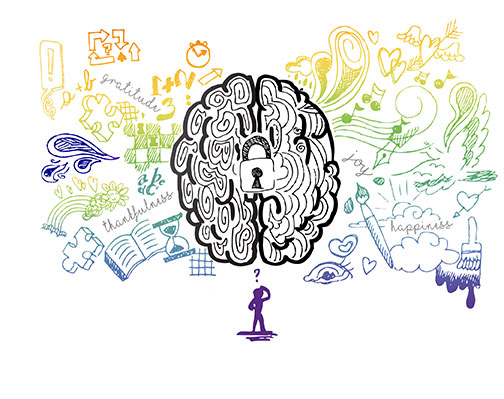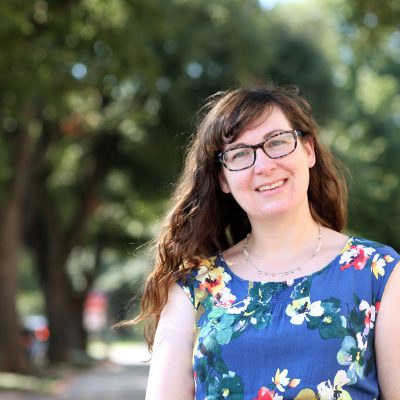Beyond the Spectrum
Naomi Ekas is using positive psychology to ease the stress experienced by parents of children with autism.

Beyond the Spectrum
Naomi Ekas is using positive psychology to ease the stress experienced by parents of children with autism.
From misunderstanding social norms to enduring severe physical disabilities, a childhood with autism can involve struggles.
For parents of children with autism, life can involve difficulties too. “The rate of depression in that population is about two to three times higher than the average,” said Naomi Ekas, assistant professor of psychology. “It’s a pretty stressful experience.”
While the parents’ frustrations are justified, keeping a good attitude is crucial, said Ekas, who is developing a set of research-based methods to help parents find the positive in what can be bumpy, chaotic lives.

Naomi Ekas, assistant professor of psychology, helps children with autism — and their families — through evidence and research. (photo by Carolyn Cruz)
At least 1 in 68 children in the U.S. has a diagnosis placing them “on the autism spectrum,” reports the Centers for Disease Control and Prevention.
“It’s this constant stream of worry,” said Chalea Andrejko, a Fort Worth sign-language interpreter and mother of two children with autism.
Andrejko said her anxieties lessened when she realized she couldn’t change her kids or the reactions of strangers who didn’t understand their confusing autism-related behaviors. She instead focused on improving her own mindset. “I worry a whole lot less about what other people are thinking now.”
Andrejko’s revelation is the type of message Ekas wants to share with parents who are having a difficult time. For parents who may be close to succumbing to hopelessness, the professor said: “It’s particularly important to say, ‘You know, this might not change, but here are some tools and some strategies that we can give you to cope.’”
In studies conducted over the internet or in an on-campus lab, Ekas met parents, including Andrejko, who learned to thrive while caring for a child with autism. By studying their activities and perspectives, the professor hopes to translate the findings into a set of therapeutic tools.
Count your blessings
One of Ekas’ recent studies uncovered how thankfulness can ease stress for mothers of children with autism.
Participants took part in a two-month “gratitude intervention.” Half of the moms wrote a brief letter expressing thanks to someone of their choosing once a week, a letter they didn’t have to actually send. The other half, the control group, wrote a weekly list of activities they did over the same period.
Andrejko participated, even composing a heartfelt thanks to her ex-husband. The study “was a nice way to think about all the things you’re grateful for in life,” she said. “When you’re counting your blessings … it makes you feel more positive about everything.”
Andrejko wasn’t alone. Ekas reported that the mothers who were required to be thankful experienced an improved sense of wellbeing, and the emotional buoyancy lasted for more than a month. The gratitude group also reported greater marital satisfaction and an uptick in parental confidence.
To Ekas’ surprise, the control group enjoyed similar benefits. Why? “We think maybe just the act of writing,” she said, “or reflecting on the things that they were able to accomplish that they might not see in the moment.”
Seeking happiness
“I think people connect to that. When average people are surfing online, they’re searching for how to live a happier life. They’re not Googling how to live a less-negative life.”
Naomi Ekas
Ekas’ specialty is positive psychology. The field, she said, inverts the usual “what’s wrong with you?” diagnostic approach. Instead of labeling behavioral problems or neurological anomalies, researchers examine the aspects of life typically associated with happiness.
“I think people connect to that. When average people are surfing online, they’re searching for how to live a happier life,” the professor said. “They’re not Googling how to live a less-negative life.”
Gratitude was one of several positivity dimensions Ekas examined in recent years in the context of parents of kids with autism. Other studies looked at faith, having hope for the future and creating a meaningful life, which the professor described as “being part of something bigger than yourself that is positive.”
Autism Speaks, the world’s largest autism-focused advocacy organization, shared the results of a study conducted by Ekas and the University of Miami’s Michael Alessandri.
The researchers found evidence that noticing the benefits related to an autism diagnosis strengthened the sometimes frayed marital bonds between parents of children with autism. Advice about healthy perspectives helps, Ekas said, but their experiences will never be “just sunshine and lollipops.”
Ekas wanted to expose her students to the realities of caring for children with autism, some who may rely on parental care for life. To that end, the professor organized a monthly “respite” night at a Fort Worth school, where student-volunteers entertain the kids while frazzled parents enjoy a free night.
Ekas said she encounters many students who say service is their life goal, but they can harbor a common misconception. “They say, ‘I need to be doing therapy to help people.’ I tell them, ‘No you don’t. You can do research and you can help people.’”

Your comments are welcome
2 Comments
Way to go Chalea! You are doing an awesome job!
Related reading:
Features
Politics 101
Students appraise the political landscape
Features, Research + Discovery
Leading a Culture Change in Health Care
Faculty at the Harris College of Nursing & Health Sciences are helping fuse research with health care practice.